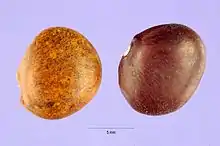Phaseolus maculatus
Phaseolus maculatus (Metcalfe bean, prairie bean, spotted bean) is a plant native to Mexico and the southwestern United States from Arizona, New Mexico, and Texas. It is found on dry, rocky hillsides in meadows and in wooded areas from 1500 to 2400 m (5000–8000 ft) in elevation.[3][4]
| Phaseolus maculatus | |
|---|---|
 | |
| Scientific classification | |
| Kingdom: | Plantae |
| Clade: | Tracheophytes |
| Clade: | Angiosperms |
| Clade: | Eudicots |
| Clade: | Rosids |
| Order: | Fabales |
| Family: | Fabaceae |
| Subfamily: | Faboideae |
| Genus: | Phaseolus |
| Species: | P. maculatus |
| Binomial name | |
| Phaseolus maculatus | |
| Synonyms[1][2] | |
| |
P. maculatus is a trailing perennial herb with a large, woody taproot. Leaves are trifoliate, oval, up to 8 cm (3.2 in) long, with small uncinate (hooked) hairs. Leaf blades tend to be oriented vertically so they do are not pressed against the ground. Flowers are purple. Seeds are mottled black and brown.[5][6][7]
Uses
This bean is often used as livestock forage, and it is cited as a gene source for disease resistance in the lima bean (P. lunatus) by Germplasm Resources Information Network. The Tarahumara peoples of the Sierra Madre Occidental in Chihuahua use the roots medicinally and also make glue from the shoots.[8] The species is also occasionally grown as an ornamental.[9]
References
- Tropicos
- The Plant List
- Thomas H. Kearney & Robert H. Peebles. 1979. Arizona Flora, with Supplement, Second Edition. University of California Press, Berkeley./ ISBN 0-520-00637-2
- P. Martin et al. 2000. Gentry's Rio Mayo Plants. The Tropical Deciduous Forest & Environs of Northwest Mexico. University of Arizona Press, Tucson
- Plants of the Gila Wilderness, Western New Mexico University Department of Natural Sciences
- Scheele, George Heinrich Adolf. Linnaea 21(4): 465–467. 1848.
- Freytag, G. F. & D. G. Debouck. 2002. Taxonomy, distribution, and ecology of the genus Phaseolus (Leguminosae-Papilionoideae) in North America, Mexico and Central America. Sida, Botanical Miscellany 23: i–xviii,.
- Pennington, CW. 1963. The Tarahumar of Mexico, their material culture. University of Utah Press, Salt Lake City
- Backyard Gardener
External links
- "Phaseolus maculatus". Germplasm Resources Information Network. Agricultural Research Service, United States Department of Agriculture.
- USDA Plans Profile: Phaseolus maculatus